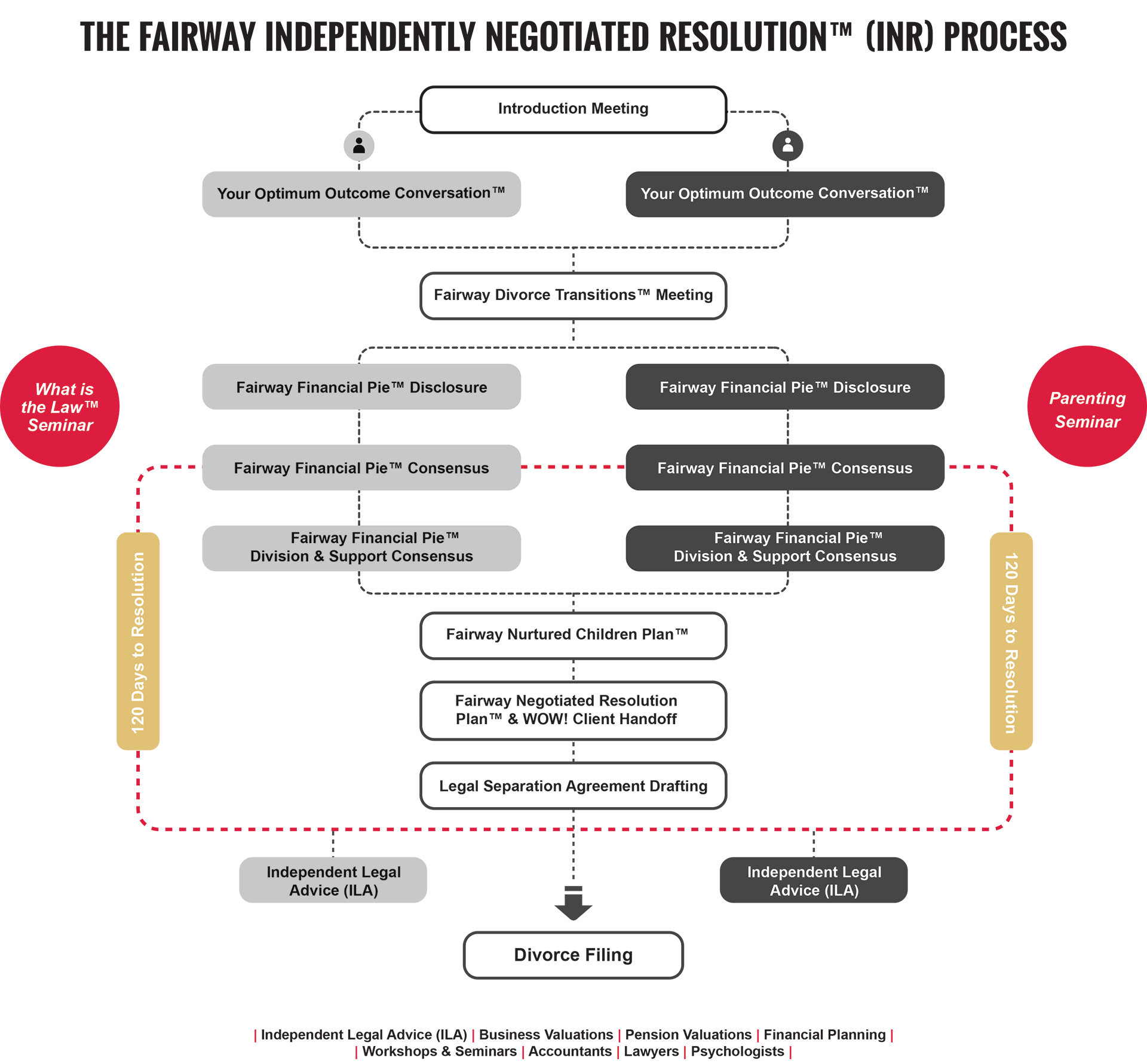What is the Nurtured Children Plan™?
The Nurtured Children Plan™ from Fairway Divorce Solutions is a personalized parenting plan that supports families navigating divorce. It’s not a checklist or a legal form — it’s a thoughtful, real-life plan designed around your children’s emotional and developmental needs. Instead of being dragged into court or stuck in a cycle of arguments, you and your co-parent receive professional guidance to build a framework that helps your children thrive.
This plan is developed with the help of family mediators who understand what children need during divorce — and what parents need to stay focused, calm, and cooperative. Whether your divorce is amicable or strained, the Nurtured Children Plan keeps the attention on your kids and gives you the tools to raise them with stability, clarity, and respect.
When your life changes, your parenting shouldn’t fall apart
Divorce changes everything. Parents often describe the experience as disorienting — routines disappear, emotions run high, and the sense of being in control vanishes. And for those with children, the fear of losing connection with them can be overwhelming. One parent shared, “I didn’t want to become a visitor in my kids’ lives. I just wanted to be their parent.”
That fear is real, and it’s valid. That’s why the Nurtured Children Plan isn’t focused on percentages or time sheets — it’s about helping you preserve your relationship with your children through meaningful structure and healthy interaction.
Why families choose the Nurtured Children Plan™
-
Protect your children’s emotional well-being
-
Avoid court and high legal fees
-
Work with experts in parenting and finance — not just legal forms
-
Create a long-term parenting agreement that adapts as your children grow
-
Stay in control of the process, not at the mercy of family court dates
You’ll walk away with co parenting arrangements that make sense for your unique family.
Is this the right plan for your family?
The Nurtured Children Plan™ is right for you if:
-
You want to shield your kids from divorce conflict
-
You’re willing to work toward a collaborative plan that focuses on your children’s needs
-
You need clarity on parenting time, communication, and finances
-
You want support from professionals who’ve guided thousands of families
-
You don’t want a judge deciding what’s best for your children
What’s included in your co parenting plan
Every family is different, but an effective parenting plan typically includes:
Parenting schedules
Customized weekly rotations, holidays, birthdays, and travel — all focused on minimizing disruption for the kids.
Decision-making
Clear agreements on school, health, religion, and activities — without power struggles.
Child support and agreements on shared costs
Fair, transparent agreements on child support, parental responsibility, Section 7 expenses, recalculations, and extra costs like camps or tutors.
Communication support
Strategies that help you and your co-parent communicate respectfully — even if you’re not on good terms — to ensure we find the best parenting arrangements for your family.
Milestone planning
Proactive agreements around future important decisions, like new partner introductions, post-secondary expenses, and evolving teenage independence.
Putting your children’s needs first
Children don’t measure time in hours or calendars. They remember experiences — late-night talks, help with homework, or watching movies on the couch. They remember the emotional tone more than the logistics. That’s why Fairway’s Nurtured Children Plan is built around preserving those emotional bonds, even when parenting happens in two households.
We help parents agree on routines and expectations that support their children’s development. That includes decisions about after-school care, health appointments, school activities, and relationships with extended family. These routines and expectations can look different depending on the child's age. For younger children, we emphasize detail and consistency. For older children, we incorporate flexibility and autonomy. The result is a plan that supports growth while reducing disruption.
A smarter way to separate
The traditional route to divorce is slow, costly, and combative. It often involves multiple lawyers, court appearances, and emotionally draining delays. Many families spend years trying to resolve parenting issues and child custody arrangements — and during that time, children are left in limbo.
With Fairway, you can avoid that. Our structured process has helped thousands of families reach agreement within 120 days of financial disclosure. Everything is handled under one roof — legal guidance, financial planning, and parenting support — all delivered at a flat, predetermined fee. There are no hidden costs, no billable hours, and no courtroom drama.
We also keep you in control by working with each parent individually throughout the process. This reduces emotional tension and gives you space to make decisions at your own pace. We believe that with the right support, parents can resolve even the most complex issues without sacrificing their children’s well-being.
A parenting plan that actually works
We’ve helped more than 7,300 Canadian families. Over 16,000 children have been protected through the Fairway method.
Let’s talk. Book your free introduction meeting to take the first step toward a better future for your children.
Getting a divorce through the traditional system takes an average of 3 years in Canada and that does not include if you have to involve courtroom litigation.
Client testimonials
Success comes in many forms. For us, it is hearing back from our clients and reading how we have changed their lives for the better. These stories are the reason we do what we do.

I would like to thank Fairway Divorce Solutions for the assistance required for final closure on our divorce. You have been instrumental in aiding to ensure common sense, law and the best interests of our children were at the forefront of our negotiations. This could not have been easy for the Senior Negotiators due to the emotions involved at times. You have helped make a difficult decision that much easier on all family members involved.
- Fairway Client, June 2018
The Unique Fairway Method
Divorce is difficult. We make is easier from start to finish. The Clear Road to a New Life®

Fairway Divorce Solutions meets your needs
Locations
Helping Canadians with divorce mediation since 2006, with more than 25 Divorce Resolution Mediators in more than 11 locations.
Head Office
Head Office
Manitoba
WinnipegAlberta
Airdrie Calgary Edmonton East Edmonton Southwest Edmonton Northwest Fort McMurray Fort Saskatchewan Grande Prairie Leduc Lethbridge Medicine Hat Okotoks Red Deer Sherwood ParkOntario
Waterloo WellingtonSaskatchewan
SaskatoonFrequently asked questions
When sharing news of your separation, sit down together to provide unified reassurance. Explain your new living arrangements simply, emphasizing your continued love and commitment to their wellbeing. Assure them that joint custody means they'll have consistent, quality time in both homes, always keeping the child's best interest at heart. Older kids may benefit from private conversations tailored to their emotional needs.
Avoid language suggesting abandonment or lost love between parents. Instead, clearly explain your shared parenting arrangement and reassure your kids they'll maintain strong relationships with both parents. Never ask them to pick sides or choose living arrangements; instead, seek their feedback on schedules and routines. Remember, separated parents making decisions cooperatively reduces stress and anxiety for everyone.
A child-focused co-parenting plan puts your child's best interest first, establishing clear guidelines on living arrangements, child care schedules, education, and joint custody decisions. At Fairway Divorce Solutions, our skilled family mediation professionals guide you in crafting a personalized parenting plan that aligns with family law, ensuring stability and minimizing conflict between separated parents.
Make transitions comfortable by clearly communicating schedules and involving your children in personalizing their spaces at each home. Duplicate essential items to foster a sense of familiarity, and maintain consistent child care routines. Reinforce the positives of equal parenting time, ensuring your kids feel secure and loved in both homes.
Absolutely. Family mediation through Fairway Divorce Solutions provides structured support to separated parents facing disagreements on living arrangements, child care, education, and other joint custody issues. A trained mediator facilitates constructive conversations, focusing on creating solutions that prioritize your child's best interest and foster cooperative co-parenting.
Adopt a respectful, professional approach to co-parenting communication. Schedule regular discussions or calls, clearly outlining topics like living arrangements, child care, and joint custody decisions. Provide advance notice when requesting changes, and approach conversations with openness. Utilizing family mediation to create a formal co-parenting communication plan helps minimize conflict and ensures decisions always prioritize your child's best interest.









